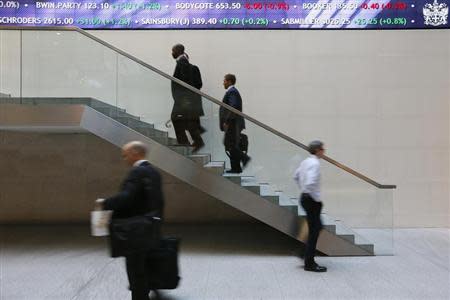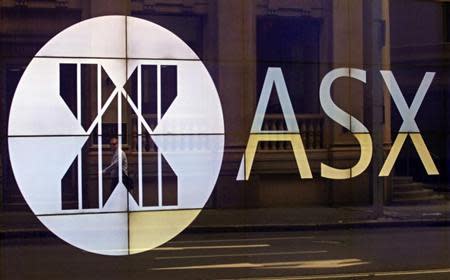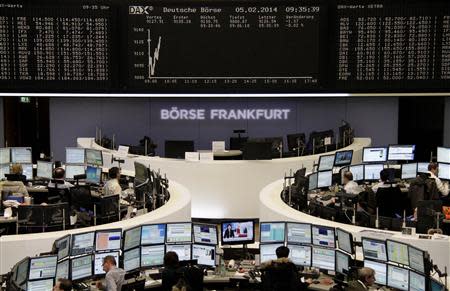Reduced tension over Ukraine calms markets
By David Gaffen and Marc Jones NEW YORK/LONDON (Reuters) - A semblance of calm returned to world markets on Wednesday after two days of intense volatility, with the United States and Russia set to hold talks on easing East-West tension in Ukraine. An index of global equity shares <.MIWD00000PUS> was modestly higher, currency and bond markets stabilized and oil prices dipped again as the West stepped up efforts to persuade Moscow to pull its forces back in Crimea and avert the risk of a war. Russian President Vladimir Putin said on Tuesday that military force would only be used as a last resort. "Things are indeed calming down in Ukraine," said Steen Groendahl, head of global research at Nordea in Helsinki. "Quite honestly, markets have taken this in their stride. There was a knee-jerk reaction on Monday but since then it has sort of been smooth sailing." Wall Street was little changed, with the Standard & Poor's 500 Index slightly higher after closing at another record on Tuesday. Softer-than-expected jobs data from ADP dampened expectations for Friday's U.S. non-farm payrolls figures. A separate reading on U.S. service sector activity was weaker than expected, but still pointed to expansion in that sector. Investors seemed to chalk up the weakness overall to the weather. U.S. crude fell to $102.04, down $1.29, after falling $1.59 on Tuesday. The contract hit its highest level since September 20 on Monday at $105.22. The Dow Jones industrial average <.DJI> was down 36.86 points, or 0.22 percent, at 16,359.02. The Standard & Poor's 500 Index <.SPX> was down 0.77 points, or 0.04 percent, at 1,873.14. The Nasdaq Composite Index <.IXIC> was up 1.18 points, or 0.03 percent, at 4,353.15. European shares <.FTEU3>, which surged more than 2 percent on Tuesday to spur a global rebound, traded sideways as currency and bond markets also stabilized. Russian stocks <.MCX> and the ruble fought off early weakness as investors decided Moscow was dialing down the intensity of its rhetoric over Ukraine. Putin said he did not want political tension to detract from economic cooperation with Russia's "traditional partners. The relative calm in Crimea allowed attention in Europe to drift back toward Thursday's meeting of the European Central Bank. The euro edged down to $1.3736, having dipped overnight. Benchmark Bunds lost ground as the German bond market's general safe-haven appeal waned. ECB policymakers remain under pressure either to cut interest rates again or use additional unconventional measures to fend off the threat of ultra-low inflation turning into something more damaging. Analysts at Citi said in a note that their base-case expectation was that the bank would cut rates by 15 basis points to 0.10 percent. But many others think it will hold off for now. Revised PMI data on Wednesday showed euro zone firms registered their fastest growth rate in over 2-1/2 years last month, though the gulf between growth in Germany and the decline in France continued to temper the mood. The tensions between Russia and the West have added to pressure on emerging markets. Some are already struggling to cope with investors shifting away because the U.S. Federal Reserve is reducing its flow of cheap funding. Emerging market equities have had 22 consecutive weeks of outflows, according to Bank of America-Merrill Lynch data. "The big question we are all thinking about is when to go back into emerging markets," said Hans Peterson, global head of asset allocation at SEB investment management. "It might take a few more weeks before we see some stability in U.S. data, so we are probably still a bit away from the entry point." In Asia, Tokyo's Nikkei <.N225> climbed 1.2 percent after the S&P 500's <.SPX> record finish on Tuesday. In the currency market, the calmer geopolitical view kept the yen under pressure after a heavy reversal on Tuesday. The dollar was last buying 102.30 yen, moving away from a one-month low of 101.20 hit on Monday, while the euro bought 140.56 yen. The Australian dollar gained to $0.8979 on revived risk appetite and data showing the country's economic growth had beaten forecasts. Australia's major trading partner, China, said on Wednesday it would maintain its economic growth target for 2014 at around 7.5 percent, as expected, and push forward with convertibility of the yuan. Spot gold, another safe-haven asset that rose on the Russia-West tensions, gained $5.40 to $1,339.31 an ounce after dropping 1.2 percent on Tuesday. (Additional reporting by Shinichi Saoshiro and Lisa Twaronite in Tokyo and A. Ananthalakshmi in Singapore; Editing by Toby Chopra, Ruth Pitchford and Dan Grebler)






